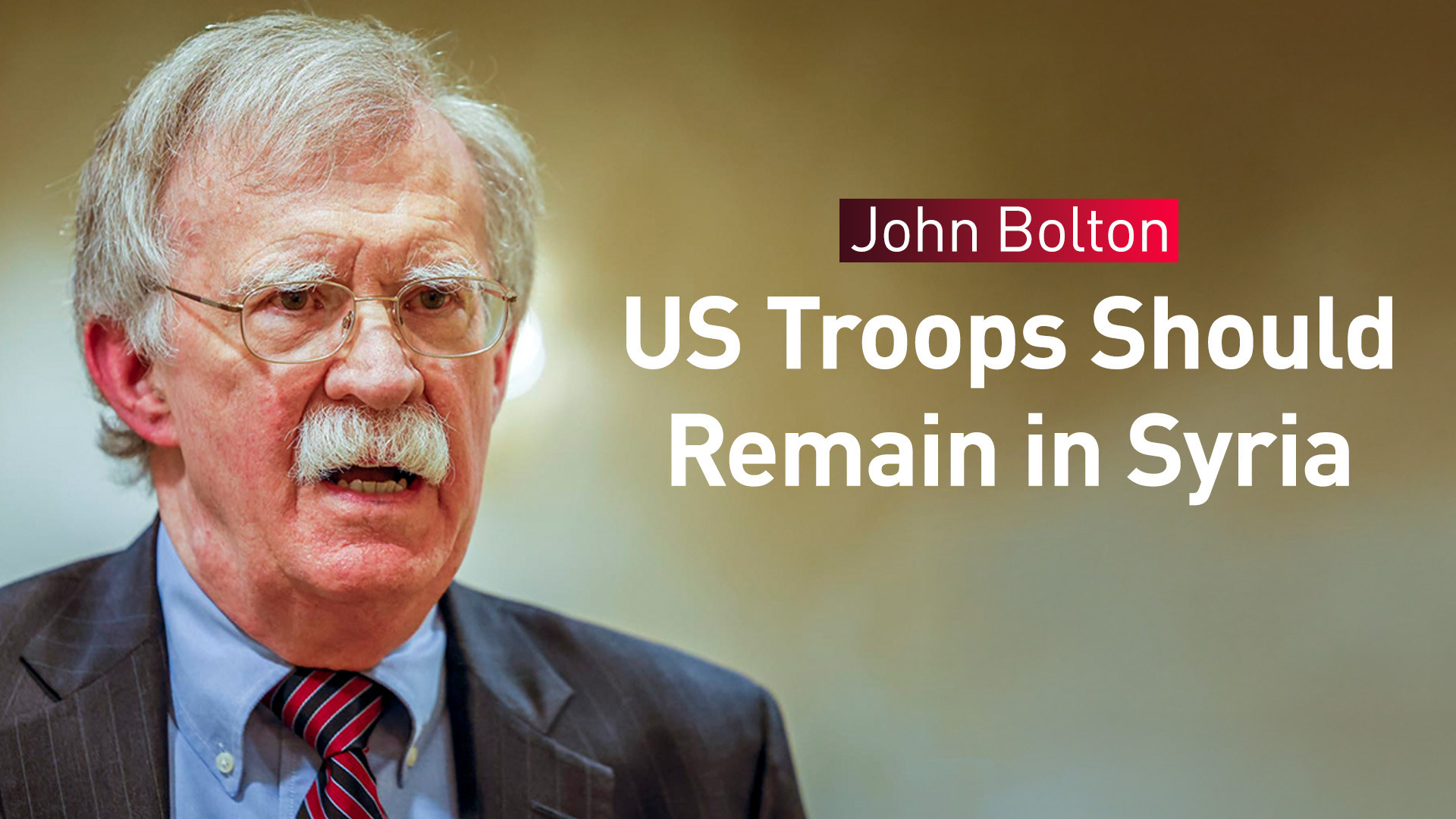John Bolton: US Troops Should Remain in Syria
We’d like to see a stable non-terror state, and one that would be hostile to ISIS, and for Turkey to remain within its borders.

Jan 11, 2025
WASHINGTON DC, United States (Kurdistan 24) Amb. John Bolton served as U.N. ambassador under President George W. Bush and then as one of Donald Trump’s four National Security Advisers during Trump’s initial term as president.
Bolton spoke with Kurdistan 24 on Friday and stressed the importance of U.S. forces remaining in northeast Syria, even after the fall of the Assad regime.
Bolton identified Iran as “the major problem in the region,” while he affirmed that following Assad’s collapse, along with Israel’s decimation of Hamas and Hizbollah, “Iran has been set back very substantially.”
Yet “there’s still a lot of instability and there’s still many threats in the region,” Bolton said, and, hence, the need for a continued U.S. military presence.
Syria: Hayat Tahrir al-Sham
The course of developments in Syria will have a major impact in the broader Middle East. “It’s just not clear whether this new government in Damascus has really given up its terrorist background,” Bolton said. “They say that they have, but I think they still haven’t demonstrated sufficiently, to me, at least, that that’s a serious commitment.”
Bolton suggested that a promising sign would be if the new Hayat Tahrir al-Sham (HTS) government asked the Russians to leave their two military bases in Syria: the Tartus Naval Base and the Khmeimim Air Base near Latakia.
“I think what we’d like to see is a stable non-terror state, bordering, obviously Israel and Lebanon and Jordan, and one that would be hostile to ISIS at the same time, and for Turkey to remain within its borders,” he stated.
“I think that U.S. policy should be to make sure that HTS does not gain control of the entire country, if it remains a terrorist group,” Bolton continued. “I think U,S, forces should remain in northeastern Syria alongside the SDF [the Kurdish-led Syrian Democratic Forces], which are still guarding 10,000 to 12,000 ISIS prisoners.”
“And I think the U.S. should stay at al-Tanf, as well,” he added, referring to the U.S. military base in eastern Syria, close to the borders with Iraq and Jordan and which sits astride—and monitors traffic along—the Baghdad-Damascus highway.
Trump’s Policy
Asked what the policy of Donald Trump—who will become U.S. president in nine days– will likely be toward Syria, Bolton responded that it was difficult to know.
Many of Trump’s advisers might well favor an independent Kurdish state, as Bolton does, “but there are a lot of obstacles.”
Bolton recalled that in 2019, Trump ordered the withdrawal of U.S. troops in northeast Syria. However, Trump’s decision met strong opposition within the U.S. Congress, including from Republicans, and he was obliged to reverse it.
However, the same scenario could play out again. “If [Turkish President Recep Tayyip] Erdogan says to Trump after January 20, as he did to Trump back in 2018 and 2019, that he wants Turkey to handle matters in northern Syria, that could be very damaging to Kurdish forces there,” Bolton explained.
“We just don’t know what Trump will say this time,” Bolton continued. “He’s focused on other matters, but events may move so quickly that he'll have to answer that question soon after he's inaugurated.”
Responding to Attacks on US Targets
Bolton was harshly critical of how the Biden administration dealt with attacks on U.S. troops by Iran and its proxies.
Rather than respond strongly to any attack—and deter future attacks—the Biden administration responded only after an assault had caused U.S. casualties.
Referring to the incoming administration, Bolton explained. “I think they should make it very clear that any further attacks on American positions will be met with a devastating retaliation.”
“I think Biden handled this wrong," Bolton said, “waiting until Americans are actually killed.”
“Attacks on both military and civilian facilities in Iraq is an act of war against the United States, and whether it's Shia militia acting on their own or Shia militia acting at the direction of Iran, it's not acceptable, and we should not tolerate it the way we have, particularly since the Hamas attack on Israel on October 7,” Bolton affirmed.
The Iranian government “needs to understand that we do not accept that our personnel are just there as targets,” Bolton stated, while he expressed a similar view of Houthi attacks on international shipping, including U.S. vessels.
“The [U.S.] attacks on the Houthis should be intensified, not just because they have been attacking Israel with drones and missiles,” Bolton said, but because the Houthis have “effectively closed the Suez Canal,” as well as “Red Sea maritime passage.”
“That is a violation of freedom of the seas,” he continued, which has long been “a principle of American foreign policy.”
“Clearly, Iran is a major, maybe almost the exclusive supplier of missiles and drones to the Houthis,” he added. “I think the Iranians need to pay a price for that too,” and “maritime passage needs to be opened again.”
Iranian Vulnerability
Bolton suggested that the Iranian regime was in increasing difficulty, and when Trump assumes office, it will face even more pressures. Israel might even get a green light from Trump to attack Iran’s nuclear weapons program.
That would create “the potential for the regime fracturing,” while “giving the people a chance to install a new government,” Bolton said. “I think we ought to help the opposition in Iran, not to the point where we become heavily involved,” as it is “really up to the people of Iran to take the initiative.”
But if we can assist them, “I certainly think we should,” he concluded.